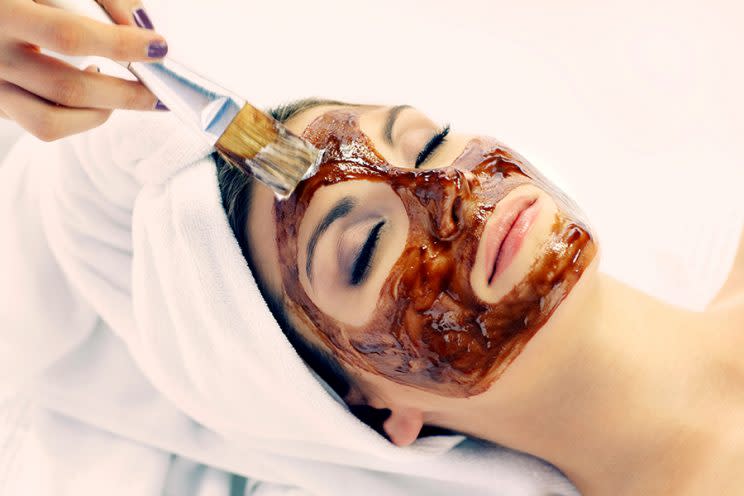Using a Nutella Face Mask to Fight Acne: an Investigation

Just a few weeks ago, Yahoo Beauty/NewBeauty reported on hairstylist Abed Allahitani of Abed & Samer, a Dubai salon, successfully using Nutella and condensed milk as hair dye.
The dye works — according to Color Wow’s Joe Cincotta, PhD, who spoke to Yahoo Beauty — because “chocolate and hazelnuts contain natural brown pigments called anthocyanins. When roasted or fermented, these anthocyanins oxidize to create the dyes.” Nutella, he said, would only be effective if you have light blonde or gray hair and can only be considered a temporary dye, washing out in a couple of shampoos.
More recently, Instagram beauty star Habiba, who has almost 280,000 followers on her Instagram, demonstrated a face mask with a Nutella-like mix of gelatin, milk, cocoa, and honey, as Rihanna’s “Where Have You Been” played in the background.
The blogger recommends the face mask for acne. “Peel it slowly,” she wrote, “as it will peel all the blackheads and whiteheads out of your skin, leaving a glowing complexion.”
As of this writing, the video has received almost 200,000 views, though response has been mixed. “Such a bad idea,” writes one commenter, while another promises to “try this right now.” Yet another asks, “Why the hell would someone put this on their face?”
To answer that question, we contacted Fayne L. Frey, MD, FAAD, founder of FryFace, LLC, and dermatologist at Dermatology & Dermatological Surgery in West Nyack, N.Y.
“The skincare industry is full of ‘self-proclaimed’ skincare beauty experts who give advice, sell advice, write about their advice [and] video their advice, mostly with good intentions,” she says. However, “most of these ‘experts’ don’t know the first thing about skin … ”
When we asked whether this concoction could technically constitute an anti-acne face mask, Frey had the following to say: “There is no standard as to what constitutes a facial mask. It is any one of many substances (fruit extracts, clays, acids, and the like) that are left on the face for an undetermined but usually short period of time. There are no scientific studies that show leaving fruit extracts, vegetable-based extracts, chocolate extracts, milk, honey or any other substance that one might find in the kitchen cupboard will rid [you] of comedones.” Comedones are a primary indicator of acne.
Those watching Habiba’s video may be tempted to forget about all that mixing and just use Nutella by itself. Frey says, “There are no placebo-controlled, double-blinded, controlled studies showing Nutella is at all beneficial to facial skin.”
In fact, she says, “Individuals with nut allergies could theoretically have a reaction to hazelnut skin application.”
“There is science showing how alpha hydroxy acids may increase desquamation [peeling] of skin cells and aid in reducing clogged pores. But these alpha hydroxy acids are most effective at low pH, not at the pH found in most OTC products and DIY concoctions.”
Eric Meinhardt, MD, is a board-certified dermatologist, as well as the founder and medical director of California Dermatology Specialists. He says, “Nutella would not work well for acne. In fact, it would worsen acne due to the oils present in it. The ingredients used in this Instagram post, however, could be helpful, mainly due to the gelatin present, which causes it to stick to pores and pull out the blackheads.
Responding specifically to the claim in the video of ridding the face of blackheads and whiteheads, Meinhardt pointed out that “blackheads are caused by irregular shedding of the pores and blockage. There are a number of prescription medications that are helpful for this, most prominently benzoyl peroxide and tretinoin.”
“Of course, it is best to always visit your dermatologist for blackhead management to help identify the source and assess proper skin regimen and not to use any of these prescription medications without medical evaluation,” says Meinhardt. “In terms of products mimicking the Instagram video, it would be helpful to use any product that starts as a cream or gel and then solidifies, allow[ing] you to peel it off, as this removes blackheads.”
Frey doesn’t believe Nutella or the DIY mask presented here will harm (or benefit) most who try them. Ultimately, she recommends dermatological care because of the potentially scarring nature of acne.
“My best advice,” Frey concludes: “Save the Nutella for your toast!”